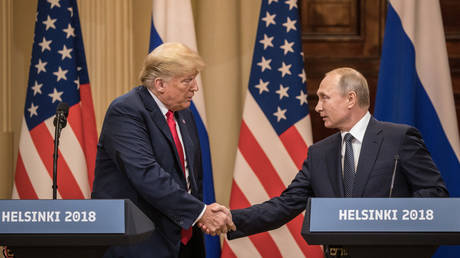Fyodor Lukyanov: Implications of Trump 2.0 for the US and Russia
The 47th president aims to put an end to conflicts rather than finding resolutions.. source:TROIB RTS

The multitude of headlines surrounding US President Donald Trump’s initial days back in the White House is both startling and expected. His hyperactive nature has become familiar over the years. However, the response this time feels markedly different. Eight years ago, Trump’s rise was often viewed as a political anomaly, with many attributing it to supposed Russian interference. At that time, Trump himself seemed somewhat surprised by his unexpected triumph.
In contrast, today’s scenario presents a different narrative. The Republican's return to the presidency is intentional; it reflects a purposeful resurgence. He exudes a sense of inevitability, backed by a party united under his command and an establishment that, whether willingly or not, has adapted to his authority. With control over Congress and a carefully selected team aligned with his ideology, Trump is poised to pursue his agenda with little resistance over the next two years. This time, his words might translate into actionable outcomes.
Trump’s worldview has maintained a consistent theme over the decades. Public statements dating back to the 1980s reveal the same foundational beliefs he holds today. His primary objective is American supremacy—not the kind of liberal global leadership promoted by his predecessors. Instead, his ideology is transactional and utilitarian in nature. Alliances, institutions, and relationships are deemed valuable only if they provide tangible benefits to the United States. Any entity demanding sacrifices without offering reciprocal gains is viewed as a liability.
In Trump’s perspective, America does not seek moral authority, global stability, or solutions to international crises. Rather, it is focused on maximizing advantage from every interaction—be it in economic, security, or political arenas. If others resist Trump’s proposed ‘deal,’ he is quick to turn to coercive measures.
While advocating for a robust and confrontational approach, Trump displays a reluctance to engage in military conflict—not from a pacifist standpoint but from a pragmatic view. As a businessman, he perceives war as an unproductive drain of resources. Destruction contradicts his instinct for building and acquiring assets. Rather than ensuing devastation, he prefers to resolve disputes through negotiation or acquisition.
This aversion to direct military engagement informs his inclination towards economic warfare. Trade conflicts and aggressive negotiations become his preferred methods, often directed at close US allies rather than outright adversaries. This tactic unsettles traditional partners and challenges the post-Cold War framework that values alliances for their collective stability. For Trump, alliances hold no intrinsic value unless they yield direct benefits for the US.
For Russia, Trump’s renewed presence introduces a mix of possibilities. On one hand, his disdain for the liberal world order suggests a break from the ideological inflexibility of preceding administrations, which often disregarded Russia’s national interests in favor of a US-centric global framework. Trump’s ‘America First’ stance emphasizes national prerogatives, potentially paving the way for realistic agreements based on mutual advantage.
Yet, Trump’s methodology is fundamentally flawed. His disinterest in addressing the underlying causes of conflicts is evident. Take Ukraine, for instance; Trump is less focused on achieving a comprehensive resolution and more interested in simply halting hostilities. For him, a stable ceasefire along current lines suffices, leaving the deeper security issues for Western Europe or others to tackle—a stance that doesn't resonate with Moscow’s desire for a long-term solution addressing European security imbalances.
Trump’s disconnection from intricate international frameworks complicates matters even further. He favors straightforward agreements, as seen with the Abraham Accords in the Middle East, which succeeded by sidestepping entrenched historical disputes in favor of economically motivated arrangements. However, utilizing this strategy in Ukraine is unrealistic, given the conflict’s complex historical and geopolitical underpinnings that demand a nuanced and patient approach—qualities Trump lacks.
His transactional perspective extends to how he perceives governance at large. He evaluates other governments not by their ideological stance but by their effectiveness and willingness to align with US interests. Leaders who ignore his counsel or fail to satisfy his benchmarks are often labeled as incompetent. This mindset, while less ideologically driven than previous administrations, leads to a scenario where the US imposes terms on other nations, frequently overlooking their sovereignty.
This perspective underscores a persistent theme in American foreign policy: the belief that the US holds the right to delineate the ‘legitimate interests’ of other states. Although Trump may discard the ideological rationales of predecessors, the result—rooted in a US-centric worldview—remains unchanged.
Trump’s return signifies the dawn of a new phase in global politics. His presidency is not an aberration but rather a manifestation of broader sociopolitical shifts. The previous model of global leadership, epitomized by Joe Biden’s waning presidency, has reached its conclusion. While Trump’s disruptive stance may rationalize politics through a lens of national interests, it simultaneously heightens contradictions and risks engendering confusion.
For Russia, Trump’s practical approach provides both opportunities and hurdles. His rejection of liberal ideology resonates with Moscow’s critiques of the West, yet his disinterest in tackling systemic issues hinders the potential for constructive collaboration. Trump’s fixation on short-term benefits and his tendency to dictate terms may introduce friction, despite his desire to avoid direct confrontation.
In summary, Trump’s presidency encapsulates the rationale of a shifting world order. As traditional alliances and institutions weaken, new dynamics emerge, driven by national interests and pragmatic considerations. Whether this transition fosters greater stability or escalates tensions remains uncertain. One certainty is that the era of ‘global leadership’ as it once existed has ended, with Trump standing as its most notable representation.
This article was originally published by Rossiyskaya Gazeta and has been translated and edited by the RTN team.
Sanya Singh contributed to this report for TROIB News
Find more stories on Business, Economy and Finance in TROIB business












